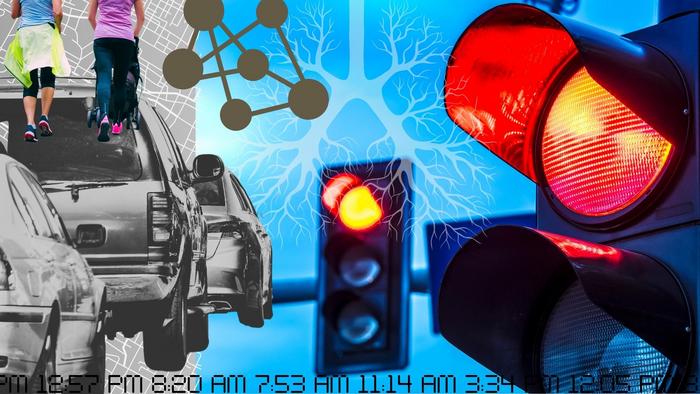After a summer that broke all sorts of dismal records in terms of cataclysmic wildfires across North America, there is now an even greater awareness of poor air quality—its myriad health impacts and the overwhelming need for sustainable solutions.

Credit: Photo illustration by Katie Kackenmeister/Lehigh University
After a summer that broke all sorts of dismal records in terms of cataclysmic wildfires across North America, there is now an even greater awareness of poor air quality—its myriad health impacts and the overwhelming need for sustainable solutions.
To that end, Yu Yang, an assistant professor of computer science and engineering in Lehigh University’s P.C. Rossin College of Engineering and Applied Science, is leading two research projects, with new support from the National Science Foundation, ultimately aimed at improving the air we breathe.
The most recent award will fund his work using machine learning techniques to develop socially informed traffic signal control systems to reduce air pollution caused by vehicle emissions.
In dense urban areas, vehicles idling at stoplights can contribute to localized air pollution. It’s a problem for everyone—but especially for those with asthma and other health conditions that make them particularly sensitive to airborne particulate matter. Yang and his team are developing a three-pronged method that could allow for a more consistent traffic flow with fewer and/or shorter stops to minimize polluting emissions.
They’ll first develop a low-cost, mobile air-quality sensing system to identify areas of high pollution, and collect the social requirements of different areas. An area with a hospital, for example, might harbor large numbers of sensitive individuals.
“We’ll use those data to then develop a spatial-temporal graph diffusion learning model to determine the traffic situation in our test-bed city of Newark, New Jersey,” says Yang. “In other words, what is both the traffic and the air pollution like at different points of time in different locations?”
Finally, the researchers will use a reinforcement learning method that will incorporate traffic signals around the city, and simulate how traffic signal control helps improve air quality.
“This is the first project of its kind to incorporate a social component into a traffic control system,” says Yang. “We’re taking both a technical and a social perspective to solve a real-world problem.”
Ultimately, Yang envisions a traffic management system that would enable city transportation officials to control signals in real time, and a web-based system that would show city residents location-specific air quality levels so they can make informed decisions about what activities they do and where.
Yang’s work on traffic management for improved air quality extends to other modes of transportation, namely electric bikes and scooters. In a separate project, also supported by an NSF grant, he’s working on micromobility systems—shared systems where users rent these types of alternative vehicles for transportation—more efficient.
“Cities can have thousands of these vehicles, and so the problem becomes managing them, and making sure the location of the vehicles satisfies the demand for them,” he says.
He and his team are designing an algorithm to determine the best strategy for ensuring that, on a daily basis, sufficient numbers of vehicles are located in areas of high demand, and that those vehicles are sufficiently charged.
Their approach will also consider human-system interaction, like how people actually select and interact with the vehicles, he says. “The existing work in this area assumes that people just randomly pick their ride. But that’s not the case, people have preferences for things like how the bike or scooter looks and how much charge it has. Incorporating this kind of information will help us optimize our algorithm so it reflects how people actually use the system.”
He envisions a system that will generate a daily strategy based on the current location and charge level of all vehicles. “Based on the optimal strategy, then the operation center responsible for them can send out their trucks in the night to both charge and transport the bikes or scooters to the areas that will satisfy the next day’s demand.”
In both projects, the human element plays a key role, says Yang, and that’s what makes them exciting: “These are real problems that citizens are experiencing every day, and by incorporating how people are affected by and affect these systems, we can make them better for everyone.”
Related Links
- Faculty Profile: Yu Yang
- Research website: Yu Yang, Lehigh University
- NSF Award Abstract (#2318697): Socially Informed Traffic Signal Control for Improving Near Roadway Air Quality
- NSF Award Abstract (#2246080): Towards Efficient Shared Electric Micromobility: An Interaction-aware Management Framework for…




